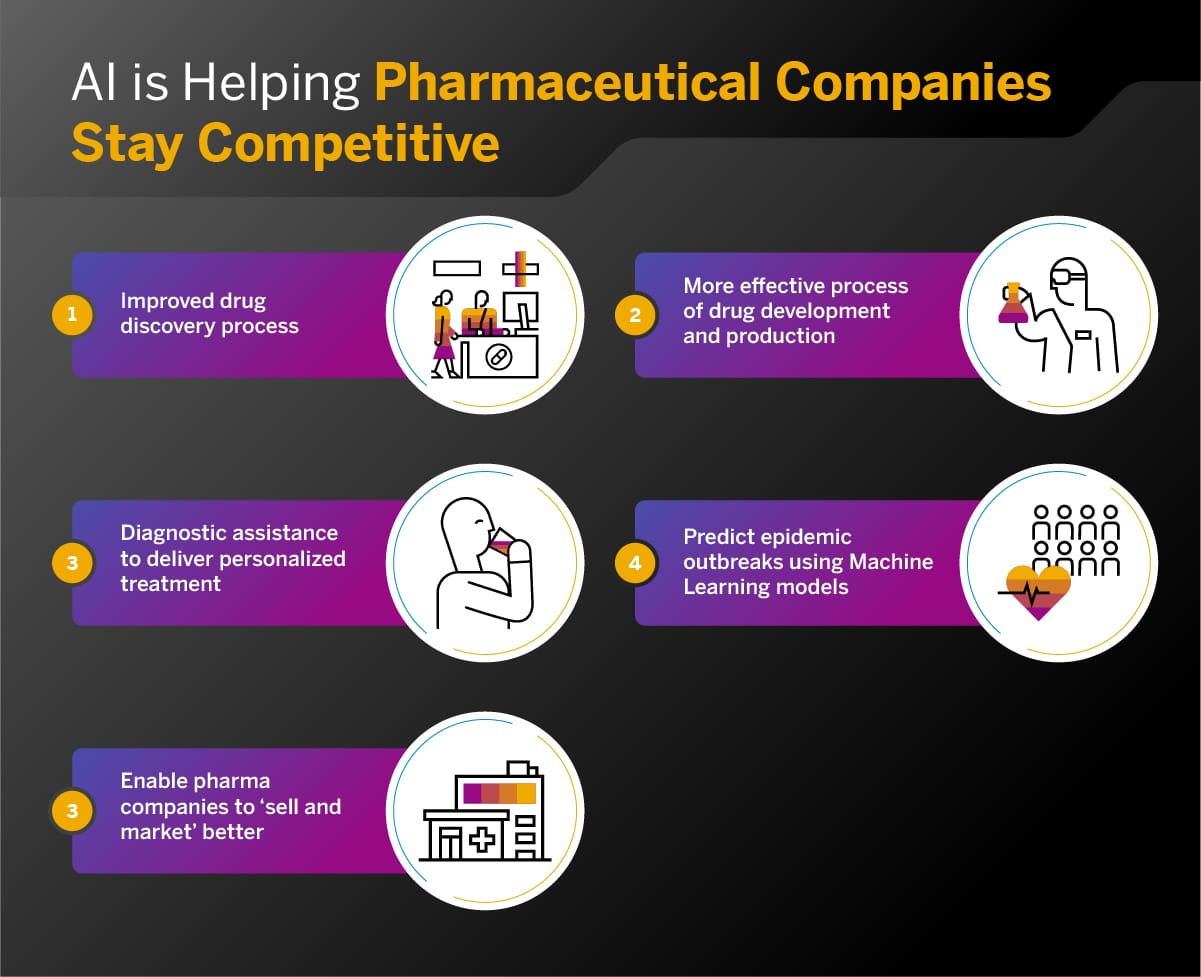Pandemics and epidemics tend to bring the healthcare industry under the limelight, and the Covid-19 pandemic was no different. In addition to logistics and civic regulations, Pharma companies have taken centre-stage during the novel Coronavirus pandemic.
As a result, the pharmaceutical market has grown exponentially, and this is expected to continue in the years to come. Research indicates that the global pharmaceutical manufacturing market, valued at USD 405.52 billion in 2020, is expected to grow at a compound annual growth rate (CAGR) of 11.34% from 2021 through 2028.
Compounding the Covid-19 impact are factors like technological advancements, an increase in the number of elderly, focus on the healthcare needs of growing countries, a rise in chronic disorders, and higher spending by pharma companies on research and development.
Naturally, every player wants to make the most of the myriad opportunities present in the market. Consequently, competition among different pharmaceutical companies has been fierce. Numerous parameters are driving this intense competition within the sector:
- Greater innovation: Companies are competing with each other in the infectious disease landscape to drive innovation. In fact, Covid-19has paved the way for a multi-billion dollar vaccine market.
- Value-driven care: Some companies are competing on customer experience, with organizations going above and beyond their call of duty. For instance, Eli Lilly, an American pharmaceutical company, is offering support to its diabetic patients who have lost their jobs or their insurance policies due to Covid-19.
- Change in operations: As per a recent McKinsey report, there is a fundamental change in pharma operations. Covid-19 has forced companies to be more open-minded, transparent, and agile. There is also a greater focus on improving network risks, both within and outside the workforce.
- Increased transparency: While the traditional-and-highly-regulated pharma industry has always been slow to embrace emerging technologies, the ongoing pandemic has changed the equation. Today, pharma brands are increasingly investing in deploying digital and AI-driven analytical tools to boost transparency across key areas such as drug development, marketing, manufacturing, and so on.
A recent report by Deloitte indicates that 75% of large organizations—those earning more than US$10 billion in revenue every year—invested over US$50 million in AI projects/technologies. Even smaller organizations—those with annual revenue of US$5-10 billion—follow the same trend; 95% of such mid-sized organizations invested up to US$50 million in 2020.

- Increased drug spending: According to a new report, a total of 300 new drugs are expected to be launched over the next five years by 2026. This is much higher than the number of new drugs launched in the last decade. Demand too is expected to see a rise—the global spending on medicines is expected to grow at a CAGR of 3-6%. While this may seem paltry, here’s the real deal—spending is expected to reach about $1.8 trillion by 2026. This is in addition to the spending on Covid-19-related vaccines and booster shots.
If competition is going to be the bedrock of growth in the near future, then artificial intelligence will play a crucial role in determining which pharma brands stay ahead of the pack.
How AI is Helping Pharmaceutical Companies to Stay Competitive?
-
Artificial Intelligence can improve the drug discovery process:
Pharma brands are leveraging the power of AI to aid the relatively expensive and competitive drug discovery process. AI solutions can successfully identify disease patterns in large datasets and help understand which drug compositions would be best suited for treating different diseases. For example, the MIT-industry consortium, ‘Machine Learning for Pharmaceutical Discovery and Synthesis‘, which comprises top pharmaceutical giants such as Bayer, Lilly, Novartis, Pfizer, etc., uses MIT’s robust machine learning solutions to improve the drug recovery process. This can:
- Help efficiently access and analyze vast amounts of chemical data to ultimately improve business processes and outcomes
- Provide critical insights into how to improve the designing, optimizing, and synthesizing of drugs
More recently, GSK partnered with Vir Biotechnology to leverage artificial intelligence for identifying antiviral compounds that can treat coronaviruses, including Covid-19.
By embracing AI solutions, pharma companies are actively working on lowering R&D costs, preventing human errors, and accelerating the research timeline—leading to affordable-yet-profitable drugs.
-
AI can help in the process of drug development and production by making it more effective:
Did you know that only 14% of all drugs in clinical trials win approval from the FDA, as per research by MIT? That is a poor outcome for clinical trials that can cost around $1 billion for each newly approved drug. This means the drug approval process can turn out to be a costly affair if the drug does not get approved. This is where AI can play an instrumental role in improving—and optimizing—the drug development process. Artificial intelligence tools can improve the success rate of new drugs by:
- Performing quality control and ensuring high-quality standards
- Driving increased automation of daily core workflows
- Fixing supply chain issues within the production line and reducing wastage of materials
- Enhancing the production reuse value
- Performing predictive maintenance and reducing operational costs
- Forecasting demand and supply changes
-
AI can provide diagnostic assistance and empower physicians to deliver personalized treatment
At the heart of personalized treatment lies real-time patient data. AI-powered solutions and machine learning technology can empower healthcare brands to:
- Embrace a data-driven approach and analyze volumes of patient data
- Set up an electronic medical record system, whereby healthcare enterprises can store sensitive patient data on secure cloud platforms
- Drive customized treatment options in real-time by enabling doctors to look at historic patient data, previous diagnostic tests, etc.
- Successfully diagnose issues. For instance, recently, the FDA authorized the marketing of an AI-drive platform—GI Genius—which can assist clinicians in detecting signs of colon cancer. This medical device leverages machine learning and AI algorithms to look for potential lesions in real-time during a colonoscopy.
- Engage in remote patient monitoring using AI-powered wearables, which is especially useful in times of a global pandemic. Such is the popularity of remote patient monitoring (RPM) devices that the global RPM systems market is projected to be worth over $117.1 billion by 2025.Here is a real-life example: Chinese tech giant Tencent teamed up with a London-based healthcare firm, Medopad, to develop an AI software that can reduce the diagnosis time for Parkinson’s Disease from 30 minutes to 3 minutes. This is achieved by looking at the existing video footage of patients and using video analysis to promote early diagnosis, successful screening, and accurate daily evaluation of key functions.
-
Artificial Intelligence can help predict epidemic outbreaks
Machine learning models are being used to predict—and prevent—epidemics such as Malaria. According to a study conducted in Maharashtra, a data mining classification algorithm—Support Vector Machine (SVM)—was used to successfully predict the onset of malaria in the early stages with a lower error rate. This type of AI/ML tool can empower organizations to engage in early preventive care and put the right measures in place to combat it. Here’s how AI can assist in epidemic prevention:
Step 1: The AI/ML tools feed on real-time information that is gathered from disparate sources across the web.
Step 2: The predictive tool studies a multitude of environmental, biological, and other factors to make connections with previous epidemic outbreaks and provide relevant patterns, trends, and solutions.
Another excellent example of predictive forecasting is GlaxoSmithKline’s use of AI to promote its seasonal medicines in the Allergy Cold and Flu category. The brand leverages a predictive model that helps chart how the upcoming season for allergy or cold and flu will shape across varied geographical regions; including where it may peak and where it may lag. This empowers the brand to:
- Inform consumers about the upcoming flu season through their website
- Enhance the national and regional media delivery
- Keep the retailers informed of key factors such as seasonal distribution, stock up, display, etc.
-
AI can enable pharma companies to ‘sell and market’ better as well as smarter
Considering that the pharma industry is inherently sales-driven, pharma companies can leverage the power of Artificial Intelligence in driving a more targeted and personalized marketing campaign. AI tools can be used to:
- Collect customer data in real-time, map out the customer journey and understand the customer’s needs, preferences, behavior, etc. better
- Curate unique marketing strategies that are aligned with the customer’s distinctive needs as well as the company’s business goals
- Measure the efficacy of marketing campaigns and analyze key performance indicators conversion rates, retention rates, etc.
- Analyze previous marketing campaigns and engage in a comparative analysis, to eliminate any inefficiencies in existing strategies. It can also help predict the success rate of marketing campaigns
AI tools can also be used to learn about in-store/online customer behavior. For instance, GlaxoSmithKline uses AI for tracking the eye movements of consumers and retailers (with their consent). The brand studies this data—collected using special eye-tracking glasses worn by shoppers in stores or online—in its dedicated shopper’s science lab, thus, enabling it to monitor how the end-user looks at the products. The AI-powered tool captures key images during the shopping process and provides analysis for Areas of Interest (AOI) metrics such as the time to first fixation, heatmaps, gaze plots, video replays, etc. This invaluable data can be used to engage in better product placement, improve the artwork and labeling of products, and discern consumer behavior from the inside out.

The writing is on the wall
It is the day and age of Artificial Intelligence. Almost no industry is untouched by AI, and the pharmaceutical industry is no different.
AI today finds application in nearly every aspect of the pharma product lifecycle. So naturally, the use of artificial intelligence in the pharma industry is not going to slow down any time soon. In fact, research suggests that 50% of global healthcare companies will actively execute AI strategies and adopt this futuristic technology by 2025.
This is hardly surprising as AI-powered solutions can bring down costs, enhance patient care, foster profitable innovation, and improve business outcomes across the value chain. Clearly, Artificial Intelligence is the future of pharma and the future is here.



